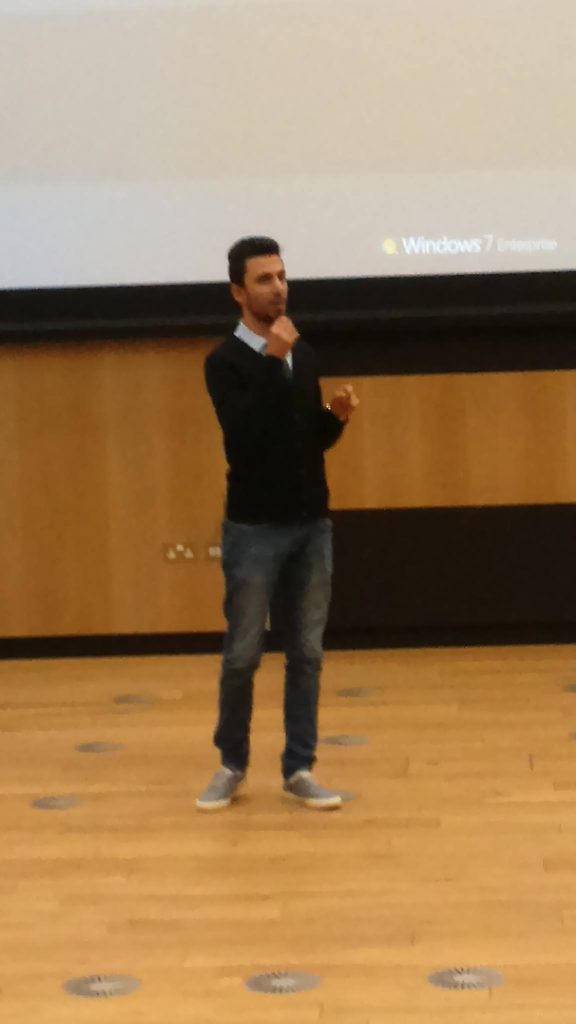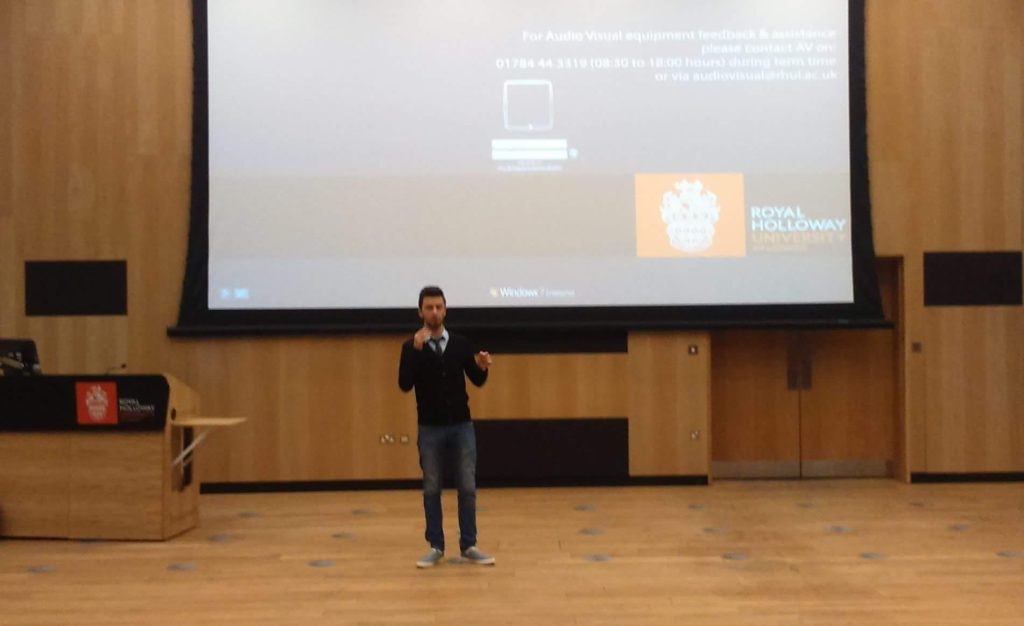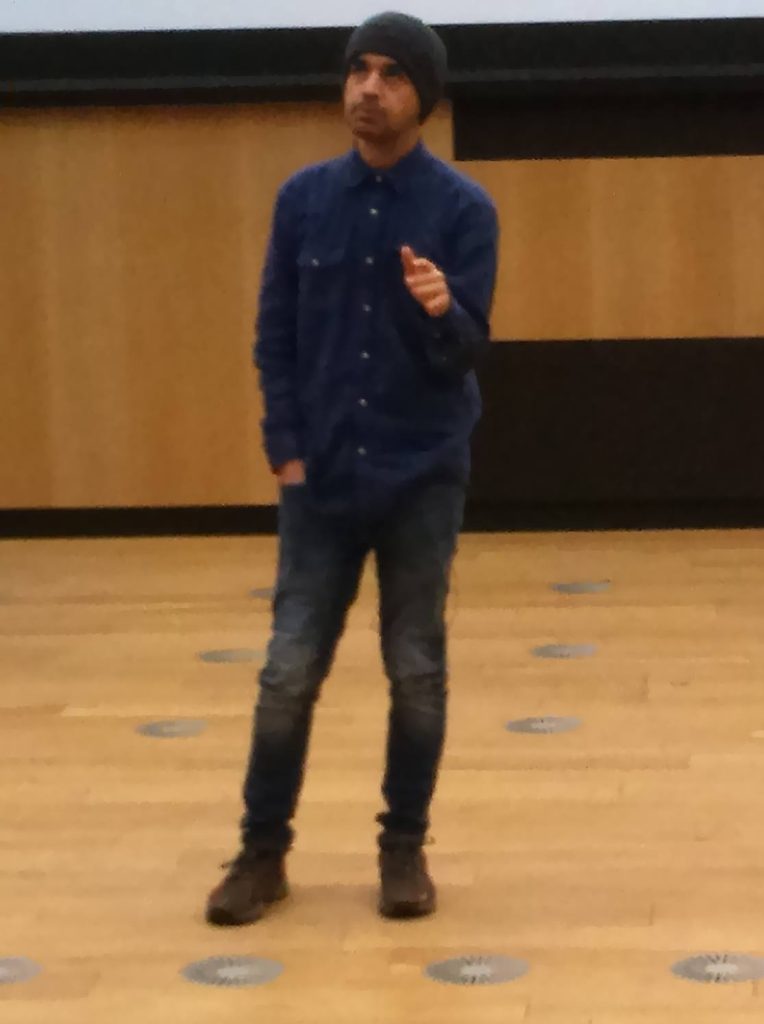
Alice Barnes-Brown attended the inspiring and eye-opening event earlier this month and gives details of the experience.
On Tuesday 2nd February, Royal Holloway’s very own Middle East society welcomed two incredible speakers, different in language and ethnicity but united by war and terror. Those in attendance were able to get a glimpse into the lives of people who come to Europe as refugees, but hope one day to return to the land they know as home. In peaceful, leafy Egham, it is easy to forget about the people behind the news stories – their experiences, their emotions, their fears. Ahmad and Bashar reminded us why we should do more to help political refugees, and why we shouldn’t subscribe to the demonization they face in the press.


Bashar, a law student at the University of East Anglia, was a child of war. At age 12, whilst he was at school, it was announced that 60 Israeli aircraft had begun airstrikes on Gaza. As his family lived close to the Israel-Palestine border, they were the first to flee. They retreated inland, but even that wasn’t safe for long. One night, when there were 6 of them sleeping in a tiny kitchen, they heard gunshots and ran to their car. The man directing the traffic away from the city told them solemnly, “on the right is life. Left is death. It’s up to you”.
4 years later, Bashar was on his way to get a haircut. His father calls him, exclaiming that once again, Israel was attacking. This time, his family went underground. When his parents left the shelter briefly, bombs started raining down upon them. Bashar and his siblings were terrified. In a scene not unlike the Blitz, they spent twenty minutes believing their parents to be dead, but unable to move from the spot as explosions could be heard outside. Eventually, his parents shouted to say they were alive. A wave of relief washed over them – but this was only temporary.
During Ramadan in 2014, yet another wave of attacks hit the West Bank. Bashar is injured after a biological bomb explodes close to him, and he inhales its toxic fumes; leaving him unable to eat, drink or move. By some miracle, he survives, but he knows he was lucky. 25,000 people were killed in this war. But where can the Palestinians go, he asks, when the surrounding countries have closed their borders?
The second speaker, Ahmad, gave an even more impassioned talk about his experiences as a Kurd. Kurdish people, whose nation transgresses the state boundaries of Turkey, Syria, Iraq and Iran, are often left out of mainstream discussions about refugees. According to Ahmad, Syrian Kurds are in a dilemma. The state will not support them, because it believes they are separatists looking to cause trouble. But neither can they look to the rebels or ISIS for support – they apparently follow the wrong sort of Islam. The Kurds really are on their own, and when ISIS invaded his town (which is just outside Aleppo), Ahmad knew he had to leave. As he vividly reconstructed with arm movements, he had witnessed some of his friends beheaded by ISIS in the town square, as an example to other dissidents. Just as in Medieval Europe, their heads were placed at the entrance to the town as a threatening symbol of power.
Ahmad moved to Kurdish Iraq, which was comparatively stable at the time. During his work with the UN there, he had rescued a 12 year old Yazidi girl who had been sold into sex slavery by ISIS. She was traumatised, and had been raped over 57 times. On the day Ahmad was to take her to the airport to fly to Germany, she had committed suicide in the hotel room. The worst of it is, this is just one tragic story in over 5,000 more cases.
When the situation in Iraq deteriorated, Ahmad decided to escape to Europe. He began by taking a coach to Bodrum (a popular Turkish holiday resort). From there, he boarded a dinghy to Greece, made for 22 people but used by 88. After his gruelling 3 hour journey to Kos (which should only take thirty minutes), he took a ferry to Piraeus, the port of Athens. Here he acquired a fake Bulgarian passport.
But there was just one problem – the lackadaisical Greek customs officials at the airport had been replaced by German policemen, trained to spot and intercept suspected migrants just by looking at them. His description of his experience in Athens Eleftherios K. Venizelos Airport particularly resonated with me. We must have been there around the same time, yet my experience could not have been more different from his. I, a carefree holidaymaker in love with my Greek surroundings, and he, a terrified refugee praying he would not be deported back to the horrors of his homeland. I could envision him there, in the departure lounge, nervously wondering if the police would capture him. Happily, they didn’t, and he flew to France.
When he reached Calais, he was told to stow away in a suffocating flour truck and await transportation to the UK. When the doors were opened 8 hours later, the Italian driver told them he was going to Rome, and Ahmad had been taken hundreds of miles in the opposite direction. The smugglers were just desperate to be rid of him. He had already wasted too much money trying to get to Europe, and at this point is very close to giving up.
And yet somehow, he doesn’t. By sheer persistence, Ahmad makes it to the UK, and upon his arrival in Hull is immediately interrogated by MI5. He now lives with an English family and works towards a Master’s degree. “I am here” he says, with joy in his voice, “and I am alive”. A clap echoes around the room. We shouldn’t congratulate ourselves just yet, though. Ahmad warns of the damage caused by the harmful stereotypes perpetuated in the media. “Europe is not heaven. People must realise that we don’t want to leave our homes and our families: we just have to”.
Both Ahmad and Bashar put a human face to all the statistics we hear about in the news. By listening to their stories and seeing the impact it still has on them, it helps to overcome prejudice and serves to instruct listeners in basic human compassion. If there’s one thing that young people can do to help, Ahmad and Bashar both agreed that education is the best weapon against intolerance, and that’s exactly what the Middle East Society have helped to promote.
